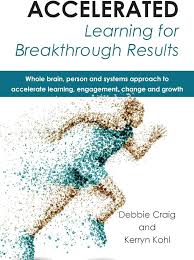Accelerated Learning Through Breakthrough Results: A Guide to Maximizing Learning Efficiency
Introduction
In today's fast-paced world, the ability to learn quickly and effectively is crucial for success. Accelerated learning techniques can significantly enhance our ability to acquire new knowledge and skills. By focusing on breakthrough results, we can optimize our learning process and achieve remarkable outcomes.
Key Strategies for Accelerated Learning
-
Set Clear Goals:
-
Specific, Measurable, Achievable, Relevant, and Time-bound (SMART) goals: Define precise objectives to stay focused and motivated.
-
Break down goals: Divide larger goals into smaller, manageable steps to track progress.
-
-
Create an Optimal Learning Environment:
-
Minimize distractions: Find a quiet, comfortable space free from interruptions.
-
Organize your materials: Keep your learning materials easily accessible and well-organized.
-
Utilize technology: Leverage tools like flashcards, apps, and online courses to enhance your learning experience.
-
-
Active Recall:
-
Practice retrieval: Actively recall information from memory instead of passively rereading it.
-
Spaced repetition: Review material at increasing intervals to reinforce learning.
-
Quizzing: Create quizzes or use online tools to test your knowledge.
-
-
Interleaving:
-
Mix it up: Alternate between different topics or skills to prevent boredom and improve retention.
-
Vary learning methods: Combine reading, listening, watching, and doing to engage multiple senses.
-
-
Teach Others:
-
Explain concepts: Explaining information to others solidifies your understanding.
-
Identify gaps: Teaching can help you identify areas where you need further clarification.
-
-
Leverage Feedback:
-
Seek feedback: Ask for input from teachers, mentors, or peers to identify areas for improvement.
-
Reflect on mistakes: Learn from your mistakes and adjust your learning strategies accordingly.
-
-
Prioritize Sleep and Rest:
-
Quality sleep: Ensure you get enough restful sleep to support cognitive function.
-
Take breaks: Incorporate short breaks throughout your learning sessions to prevent burnout.
-
-
Mindfulness and Meditation:
-
Reduce stress: Practice mindfulness techniques to reduce stress and improve focus.
-
Enhance cognitive function: Meditation can enhance attention, memory, and problem-solving skills.
-
Real-World Examples of Breakthrough Results
-
Language Acquisition: Many individuals have achieved fluency in foreign languages within a short period using accelerated learning techniques.
-
Skill Mastery: Musicians, athletes, and artists have used accelerated learning principles to achieve remarkable proficiency in their respective fields.
-
Career Advancement: Professionals have accelerated their career growth by quickly acquiring new skills and knowledge.
Conclusion
By implementing these strategies and maintaining a focused approach, you can significantly accelerate your learning process and achieve breakthrough results. Remember, consistent effort and a growth mindset are essential for maximizing your learning potential.
References
Accelerated Learning:
-
Sousa, D. A. (2017). How the Brain Learns Best. W. W. Norton & Company.
-
Medina, J. (2008). Brain Rules: 12 Principles for Surviving and Thriving in the 21st Century. Peak Performance LLC.
Learning Techniques:
-
Spaced Repetition: Bahrick, H. P., Bahrick, P. O., & Wittrock, M. C. (1975). Maintenance of knowledge and skills in adult life. Journal of Experimental Psychology: General, 104(1), 55-71.
-
Interleaving: Rohrer, D., Pashler, H., & McDaniel, M. A. (2005). Improving the effectiveness of multiple-choice tests: The value of feedback and the spacing of practice. Applied Cognitive Psychology, 19(3), 317-334.
Mindfulness and Meditation:
-
Kabat-Zinn, J. (2013). Mindfulness for Beginners: A Guide to Jon Kabat-Zinn's MBSR Mindfulness Meditation Practice. Sounds True.
-
Shapiro, S. L., Carlson, L. E., Astin, J., & Freedman, B. (1998). Mindfulness-based stress reduction for chronic pain: A randomized trial. Pain, 75(3), 219-230.
Additional Resources:
-
Khan Academy: https://www.khanacademy.org/
-
Coursera: https://www.coursera.org/
-
Duolingo: https://duolingo.com/



